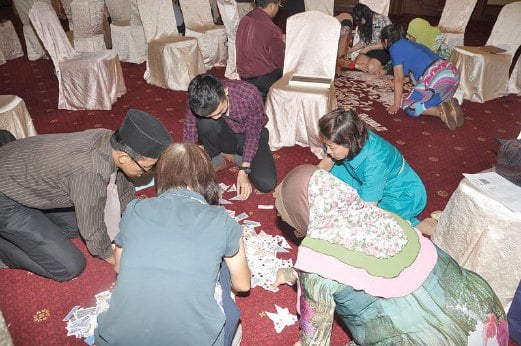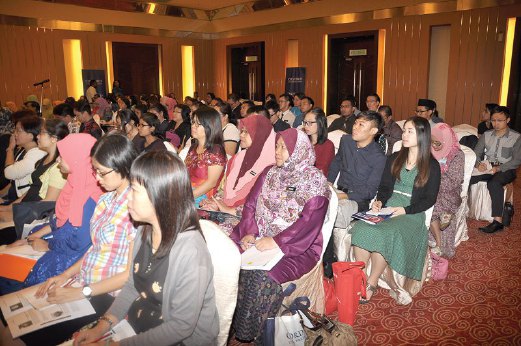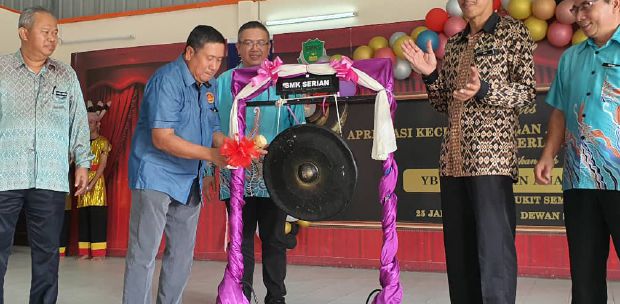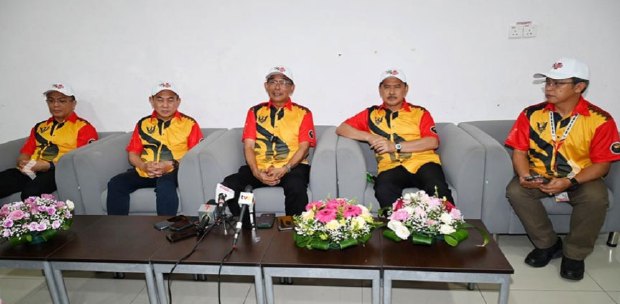CHALLENGING: To achieve success, teachers must embrace innovation in the English classroom
LUDWIG Wittgenstein, a 20th century Austrian-British engineer and philosopher, once said: “The limits of my language are the limits of my world.”
If a person is lacking in language proficiency, it holds him back from engaging socially and sharing his thoughts and feelings with others. How well one knows a language essentially determines how one lives and experiences life.
It is with this realisation that both educators and learners alike speak the same language when they talk about the challenges in the teaching and learning of English in the country.
SHARING IDEAS
At the 8th Johor English Language Teaching Association (JELTA) Conference last month, some 400 teachers, educators and language experts converged on the M-Suites Hotel in Johor Baru to share ideas and the latest developments in English language pedagogy. The aim was to provide new insights into what the 21st century education entails, and the ever-increasing challenges it presents to both teachers and learners.
The three-day conference, themed English Language Classrooms: The 4Cs and Technology, focused on giving teachers of English a greater understanding of the requirements of 21st century education, offering innovative ideas for them to bring back to their classrooms such as learning design, strategies for critical reading and teaching and learning with mobile tools.
In his welcoming address, JELTA chairman Vincent D’Silva said: “You can revitalise English language teaching by being innovative.”
He added that the potential for innovation in English language classrooms is tremendous and that all teachers need to do is to reach out and grab ideas that come along. However, he also had a word of caution.
Not all new and radical ideas work, but instead of disregarding them, he advised teachers to adopt and adapt them to suit the needs of their learners.
Dr Hariharan N. Khrishnasamy, a lecturer of English at University Utara Malaysia, said: “Reflective practice is important so that teachers continually improve on teaching methodology, material selection, pedagogical approaches and teaching aids.”
When it comes to teaching aids, he said that there are now various technologies and tools available for English language teachers but if they do not move away from the talk-and-chalk method, they may lose their students’ interest in learning the language.
4Cs AND TECHNOLOGY
It cannot be denied that technology is changing the nature of learning. According to the US National Education Technology Plan 2010, there are “three connected types of human learning — factual knowledge, procedural knowledge and motivational engagement — and these are supported by three different brain systems. Social sciences reveal that human expertise integrates all three types of learning. Technology has increased our ability to both study and enhance all three types of learning”.
As such, under Shift Two of the Malaysian Education Blueprint 2013-2025, there is emphasis on more radical and immersive approaches to the teaching and learning of the English language, in particular through the use of technology.
The four Cs refer to the following skills: critical thinking and problem-solving, communication, collaboration, and creativity and innovation.
Several immersive programmes will be carried out or have already been rolled out in the past year or so, namely: the Highly Immersive Programme, English Enhancement Programme for Schools, Professional Upskilling of English Language Teachers Programme, Literacy and Numeracy Screening (LINUS 2.0) and Nadi Ilmu Amalan Membaca.
In addition to these programmes, the Education Ministry is introducing the Common European Framework of Reference for Language (CEFR). CEFR, as included in the Roadmap 2015-2025 for English language Education Reform in Malaysia, will be a point of reference to gauge learners’ progress in English language proficiency against international standards from preschool to tertiary education.
CHALLENGES IN THE ENGLISH CLASSROOM
Jaib Singh, a freelance English teacher with more than 30 years of teaching experience, finds attitude to be the biggest stumbling block to students’ progress in learning English. “Students learn English because they are forced to do it, not because they desire to improve their proficiency in the language,” he said.
He added that as long as students do not think it is important to improve their English proficiency, they will have a mental block. Among themselves too, they make fun of those who practise the language with taunts such as “Nak jadi orang putih ke? (Do you want to be an Englishman?)”
Rokiah Ahmad, who has been teaching English in secondary schools for 25 years, said that students in the country do not have good reading skills. This was reflected in the lower rankings Malaysian students achieved in the Programme for International Student Assessment (PISA). PISA is a triennial international survey that evaluates education systems worldwide by testing 15-year-old students’ scholastic performance on mathematics, science and reading.
“Most of the students are unable to analyse, synthesise and evaluate the text they are reading. This may be because they are not exposed to the essence of critical reading strategies by their teachers. So teachers need to be aware of how to design their materials so that students can learn reading skills.”
Hariharan observed that sometimes teachers find it difficult to integrate technology into their lessons because they suffer from technophobia. They find it hard to master technology and are therefore hesitant when it comes to using it in the classroom. They are also afraid that they cannot control what students access online if allowed to use computers and the Internet.
It is all well and good to encourage teachers to use more technology in their lessons but the relevant authorities must then ramp up the facilities and infrastructures. This was the sentiment echoed by many English teachers at the conference. “The Internet connection is unreliable and teachers have resorted to using their personal data plans when using digital technology in their lessons,” said Segar Sadhasivam, who has been teaching English for eight years. “Some schools also do not have enough digital devices to be utilised,” he added. “Because of this, too much time and effort is wasted during precious learning hours.” Despite this, he said that teachers do try to utilise digital technology using platforms such as the Frog Virtual Learning Environment whenever they can.
PASSIONATELY INVOLVED
As a literacy proponent, M-Suites Hotel executive director Datin Dr Maimunah Abdul Rahman is fully aware of the importance of students in Malaysian schools learning to master English. “School-leavers have applied for jobs at the hotel but they have very poor English proficiency,” she said. “For a few years, M-Suites Hotel staff and I carried out a reading project for children from single-mother families to try to alleviate the problem. So when I was approached by JELTA to help out on a bigger scale, I agreed to collaborate.” M-Suites Hotel, the main sponsor for JELTA, provided food and lodging for the duration of the conference.
FUTURE PLANS
On future plans for JELTA, Hariharan said that because teachers and students are still grappling with the challenges in developing language competency for 21st century needs, there is a high probability that next year’s theme will be an extension of the sub-themes that have been covered this year. “We have to be comfortable with the use of technology to achieve our pedagogical goals and encourage Higher Order Thinking Skills.”






